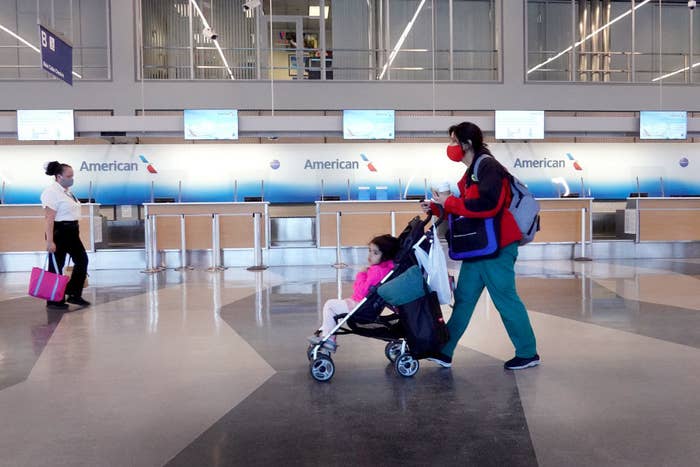
Vaccinated people can safely travel, according to new CDC guidelines released on Friday, but must continue to take COVID-19 safety precautions while doing so, like wearing a mask in public and socially distancing.
Release of the long-expected guidelines comes as US COVID-19 vaccinations have increased nationwide and as the summer travel season approaches. About 56 million people in the US, or 16.9% of the total population, are now fully vaccinated against the coronavirus, and 100 million people have received at least one vaccine dose.
“We now have several newly released studies documenting the real-world effectiveness of COVID-19 vaccines, so today we are releasing an update to our guidance for fully vaccinated people,” CDC Director Rochelle Walensky said at a White House COVID-19 briefing on Friday. “Fully vaccinated people can resume travel at low risk to themselves.”
She added, “For example, fully vaccinated grandparents can fly to visit their healthy grandkids without getting a COVID-19 test or self-quarantining, provided they follow the other recommended prevention measures while traveling.”
But, she said, as COVID-19 cases continue to rise nationwide, “I would advocate against general travel overall.”
The health agency has so far issued sparse guidance on what activities vaccinated people can safely resume. Last month, it released safety recommendations allowing vaccinated people to meet indoors with one another without masks or with one other unvaccinated household if they are at low risk of serious illnesses.
Here is what the new CDC travel guidelines say:
- Fully vaccinated people can resume domestic travel. They do not need to get tested before or after flying and do not need to self-quarantine after travel.
- Fully vaccinated people should continue to take COVID-19 precautions — like wearing a mask in public, social distancing, and washing their hands — while traveling.
- Fully vaccinated people can travel internationally without getting a COVID-19 test beforehand unless it is required by the country they are traveling to.
- Fully vaccinated people do not need to self-quarantine after returning to the US unless required by a state or local jurisdiction.
- Fully vaccinated people traveling to the US from a foreign country should have a negative COVID-19 test before they board their flights. They should also get tested for COVID-19 three to five days after returning.
In the last week, healthcare worker data released by the CDC has shown that the widely used two-dose vaccines appear to prevent 90% of COVID-19 infections, a very effective rate, which has added to public health experts’ confidence in the shots. In particular, the finding that the shots prevent asymptomatic cases, thought to play a large role in spreading the virus, has boosted confidence about easing restrictions for vaccinated people.
People are considered fully protected by the vaccines two weeks after their second dose of the Moderna or Pfizer-BioNTech vaccines, or two weeks after their single shot of the Johnson & Johnson vaccine.
Masks are still required on planes, buses, and trains under the CDC guidelines, as well as in airports and other travel hubs.
States across the US are reporting a troubling rise in cases, which Walensky has warned threatens a fourth surge. On Monday, the CDC director attributed the increase in cases to the large number of unvaccinated people in the US, states that have rushed to reopen, the spread of more transmissible variants, and increased travel. Other experts have said they are optimistic that as vaccinations continue to roll out, especially among older people and other vulnerable populations, a rise in cases will not lead to as many hospitalizations or deaths.
“We are in a life-and-death race against the virus. And the war against this virus is far from won,” Jeff Zients, the White House’s chief pandemic officer, said on Friday. “Even as we’re vaccinating record numbers of people, we have many more people to get vaccinated, and we are seeing cases rise.”
He added, “We are working to put this pandemic behind us as fast as we can, but we’re not there yet. So we need everyone to do their part.”
